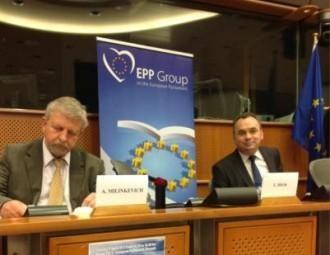Milinkevich advocating a step-by-step dialogue between Belarus and the EU

A conference devoted to Belarus was organised in the European Parliament on April 9, where the prospects of relations between the EU and Belarus were discussed.
Aliaksandr Milinkevich, the leader of the Movement for Freedom, was among other speakers, MFF reports. He stated that Europe is tired of the Belarusan problem: “On the one hand, the regime isn’t democratising, but is weakening. However, the influence of democrats doesn’t grow, as well. The absolute majority of Belarusans stands for changes, but doesn’t know who and how could implement them.”
Milinkevich is certain that in such conditions, there is no positive alternative to the conditional and critical dialogue with the European Union: “The dialogue isn’t a guaranty, but it is a chance to preserve the European prospect for Belarus. EU’s sanctions don’t release political prisoners; they increase anti-West sentiments, decrease the influence of democrats, and accelerate the economic annexation by Russia.”
As for the opponents of the policy of dialogue, Milinkevich reminded them of the following: “In the modern history of Belarus, it is not due to sanctions that prisoners of conscience were released from prisons, but after the visits by Solana and Mladenov who were to begin the dialogue. During the first attempt of dialogue in 2008-2010, political repressions decreased almost threefold, pro-European sentiments of Belarusans rose significantly, and the influence of civil society on the processes in the country expanded. The dialogue was giving Europe the tools of influence on the domestic situation in Belarus.”
“The dialogue was interrupted by the security services’ provocation with a Russian trace,” said Milinkevich of the event of December 19, 2010.
“The closer to Europe, the more independence and human rights we’ll have. Any positive step to the West is better than steps leading to greater dependence on Russia and the loss of sovereignty. Our slogan should be: “More Europe to Belarus!” More contacts, exchanges, and people’s diplomacy,” said Milinkevich.
As was previously reported, the statement entitled “More Europe for Belarus” concerning the modernisation dialogue was made recently by the MFF, “Tell the Truth!” campaign, and the Belarusan Popular Front (BPF) Party.
Milinkevich presented this statement in Brussels, pointing out the following: “A large-scale cooperation with the authorities could begin only after the release of political prisoners. EU’s dialogue with Belarus should be implemented through a road map of a step-by-step rapprochement – a step for a step. Its main goal should be to win the hearts and minds of Belarusans.”
Milinkevich called the “Dialogue on Modernisation” an extremely important project: “We need a broad popularisation of this work all over the country – through round-table conferences, meetings, discussions, and engagement of local elites and media. It’s important to continue the public discussion on the topic: “What Belarus are we dreaming of?” As the result, a “People’s Programme” should appear, as well as the faith in its implementation, the faith in ourselves and in the European prospect for our country.”
-
03.01
-
07.10
-
22.09
-
17.08
-
12.08
-
30.09








































